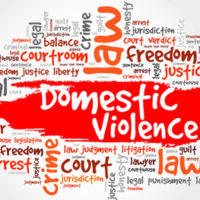How Does Virginia Deal With Domestic Violence?

Domestic violence is a broad term that encompasses many different types of violent crimes perpetrated against a family or household member. Referred to legally as family abuse under Virginia state law, domestic violence is different from many other criminal offenses. This is because domestic violence and family abuse require a specific and close relationship between the perpetrator and the victim.
What is the Definition of Domestic Violence in Virginia?
Code of Virginia Section 16.1-228 defines the offense of family abuse. In larger terms, domestic violence refers to violent crimes where the victim and perpetrator are related to each other. As explained in the next section, domestic violence only applies to family and household members, where the victim and perpetrator have a close relationship.
In more specific terms, domestic violence refers to acts of violence and force, such as assault and battery and sex crimes. Domestic violence also refers to threats of violence or force that place the victim in reasonable fear of physical injury, sexual assault, or death. If the victim and perpetrator are family or household members, then the following types of crimes can become domestic violence:
- Forceful detention;
- Stalking;
- Criminal sexual assault or similar sex crimes;
- Any crime that results in physical injury; or
- Any crime that places the victim in reasonable fear of physical injury, sexual assault, or death.
What is the Definition of a Family or Household Member in Virginia?
As detailed in the previous section, domestic violence only applies if the perpetrator and victim are family or household members. The definition of a family or household member appears under Section 16.1-228 and includes the following types of relationships:
- Marriage Relationship — A person’s current and former spouses are considered family or household members;
- Blood Relationship — A person’s parents, stepparents, children, stepchildren, brothers, sisters, half-brothers, half-sisters, grandparents, and grandchildren are considered family or household members;
- In-Law Relationship — A person’s mother-in-law, father-in-law, sons-in-law, daughters-in-law, brothers-in-law, and sisters-in-law are considered family or household members;
- Parental Relationship — Any co-parent to a shared child is considered a person’s family or household member; and
- Roommate Relationship — Any roommate or other cohabitant who shared a home within the last 12 months is considered a person’s family or household member.
What are the Penalties for Domestic Violence in Virginia?
As there are many different types of domestic violence, this offense does not come with a one-size-fits-all penalty. Instead, the penalties for domestic violence change based on the underlying offense. Stated otherwise, the penalties for domestic violence of the stalking variety are separate from the penalties for domestic violence of the sexual assault variety. Based on the type of domestic violence offense, the penalties can range from misdemeanor to felony under Virginia state law.
Do You Need Legal Help?
If you need legal help with criminal charges for domestic violence or family abuse in Virginia, it is helpful to consult with a skilled criminal defense attorney. The attorneys at Simms Showers LLP, servicing Leesburg, Winchester, Fairfax, and Manassas, have validated capabilities in the arena of criminal defense, including domestic violence and family abuse. If you need criminal defense, contact us today for a free initial consultation.
https://www.simmsshowerslaw.com/domestic-violence-under-virginia-law/
